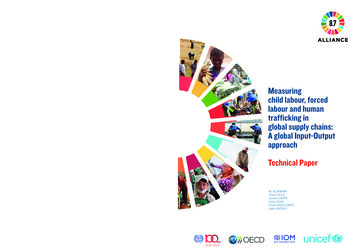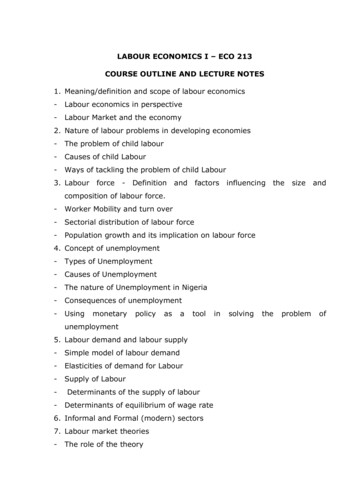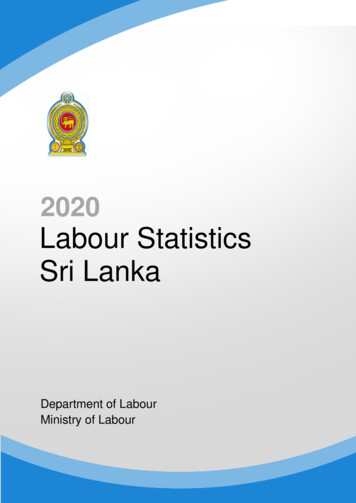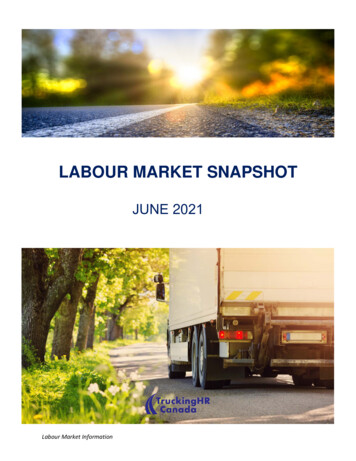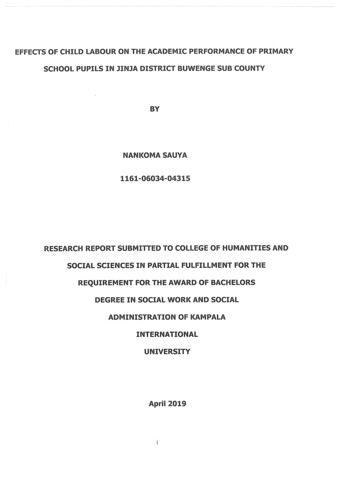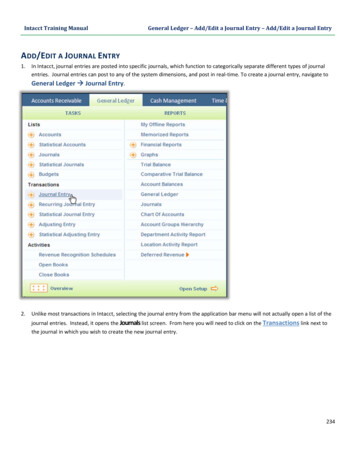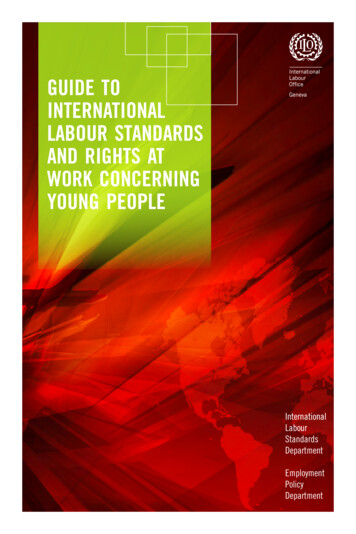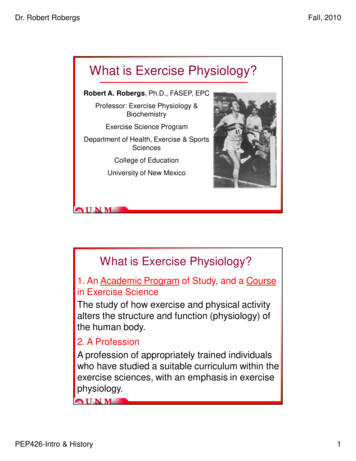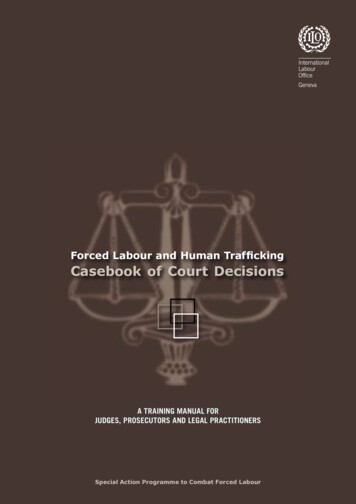
Transcription
INTERNATIONAL JOURNALOF LABOUR RESEARCHDecent workin global supply chains2 0 1 5 / V O L U M E 7 / I S S U E 1– 2
International Journal of Labour Research 2015Vol. 7Issue 1–2Decent workin globalsupply chainsINTERNATIONAL LABOUR OFFICE, GENEVAContents
Copyright International Labour Organization 2015First published 2015Publications of the International Labour Office enjoy copyright under Protocol 2 of the Universal Copyright Convention. Nevertheless, short excerpts from them may be reproduced withoutauthorization, on condition that the source is indicated. For rights of reproduction or translation,application should be made to ILO Publications (Rights and Licensing), International LabourOffice, CH-1211 Geneva 22, Switzerland, or by email: rights@ilo.org. The International LabourOffice welcomes such applications.Libraries, institutions and other users registered with a reproduction rights organization maymake copies in accordance with the licences issued to them for this purpose. Visit www.ifrro.orgto find the reproduction rights organization in your country.International Journal of Labour ResearchGeneva, International Labour Office, 2015ISSN 2076-9806ContentsILO Cataloguing in Publication DataThe designations employed in ILO publications, which are in conformity with United Nationspractice, and the presentation of material therein do not imply the expression of any opinionwhatsoever on the part of the International Labour Office concerning the legal status of anycountry, area or territory or of its authorities, or concerning the delimitation of its frontiers.The responsibility for opinions expressed in signed articles, studies and other contributions restssolely with their authors, and publication does not constitute an endorsement by the InternationalLabour Office of the opinions expressed in them.Reference to names of firms and commercial products and processes does not imply their endorsement by the International Labour Office, and any failure to mention a particular firm, commercialproduct or process is not a sign of disapproval.ILO publications and digital products can be obtained through major booksellers and digitaldistribution platforms, or ordered directly from ilo@turpin-distribution.com. For more information, visit our website: www.ilo.org/publns or contact ilopubs@ilo.org.This publication was produced by the Document and Publications Production,Printing and Distribution Branch (PRODOC) of the ILO.Graphic and typographic design, manuscript preparation, copy editing, layoutand composition, proofreading, printing, electronic publishing and distribution.PRODOC endeavours to use paper sourced from forests managedin an environmentally sustainable and socially responsible manner.Code: DTP-CORR-WEI-PCL
ContentsInternationalJournalof LabourResearch2015Vol. 7Issue 1–29 Editorial17 Worker resistance in global supply chains: Wildcat strikes,international accords and transnational campaignsMark AnnerThis article examines the relationship between labour control regimesand patterns of worker resistance in apparel global supply chains.Concentration of the geographical locations of apparel production inthe last decade has as much to do with labour control regimes as withwages and other economic factors. There are three main labour control regimes in the sector: state-party control; market despotism; andrepressive employer control. The article then argues that these systemsof labour control are conducive to three patterns of worker resistance:wildcat strikes, international accords and transnational corporate campaigns. The article explores these arguments by examining the strugglesof apparel workers in Viet Nam, Bangladesh and Honduras.labour dispute / clothing worker / clothing industry / value chains /management attitude / workers control / strike / case study / Bangladesh / Honduras /Viet Nam13.06.6KEYWORDS39 Effective protection of workers’ healthand safety in global supply chainsGarrett D. BrownOver the last 20 years, manufacturing of a wide variety of consumer goodsin the global economy has shifted from relatively well-regulated, highwage and often unionized factories in the developed world to basicallyunregulated, low-wage and rarely unionized factories in the developingworld. The prevailing supply chain approach for occupational health andsafety (OHS) protections for workers is to incorporate them into the3
InternationalJournalof LabourResearch2015Vol. 7Issue 1–2international brands’ corporate social responsibility (CSR) programmes inthe hope that there will be a “trickle-down” effect of c orporate-level OHSprotections to the factory floors of the brands’ suppliers. This approachhas resulted in only marginal improvements of working conditions inglobal supply chains. A different approach – exemplified by the workof the Maquiladora Health and Safety Support Network (MHSSN) –is a worker-centred approach where the goal is to create knowledgeable,informed and active workers in factories at all tiers of the global supplychains who are familiar with OHS concepts, hazards and controls, as wellas their rights under the law. The article highlights case studies of OHScapacity-building activities by the MHSSN and partner organizationswith workers in five countries: Mexico, Indonesia, China, the DominicanRepublic and Bangladesh.occupational safety / occupational health / value chains / industrial worker /corporate social responsibility / workers empowerment / case study / Bangladesh / China /Dominican Republic / Indonesia / Mexico13.04.2KEYWORDS55 One click to empowerment? Opportunities and challengesfor labour in the global value chain of e-commerceKathrin BirnerThe rapid growth of e-commerce in recent years has reshaped the distribution of goods to customers. It has also created new workplaces, manyof which however operate under precarious working conditions. Attemptsto organize workers have had mixed results, as can be witnessed in thecase of the efforts by workers at Amazon in Germany to obtain a collective bargaining agreement. While public interest has been extraordinary compared to other labour struggles, this area of trade union activityhas received relatively little scholarly attention. This article argues for theuse a global value chain approach to explore the opportunities and limitsfor labour organizing of e-commerce workers, with the aim of betterunderstanding their specific positions along global value chains and howtheir working conditions can be improved. E-commerce workers are a heterogeneous group over the globe: they include warehouse workers locatedat the distribution hubs of targeted markets as well as call centre agents,marketing experts and software engineers. The article examines the powerresources of labour for organizing e-commerce workers at different stagesof the value chain. Labour struggles in seven countries are comparedon the basis of documentary evidence as well as of testimonies by tradeunionists.working conditions / e-commerce / value chains / casual worker /workers rights / management attitude / trade union role / case study13.03.1KEYWORDS4
75 Global framework agreements:Achieving decent work in global supply chains?Felix HadwigerThe emergence of global framework agreements (GFAs) is a central elementin labour’s response to the globalization of production in the operationsof multinational enterprises (MNEs) through supply chains. This articleanalyses the content of the 54 most recent GFAs and evaluates 25 casestudies on GFA implementation to identify examples of good practiceto promote decent work in supply chains by developing labour relationson a global scale. Apart from constant growth in the number of GFAssince the beginning of the century, there is a qualitative evolution: GFAsare increasingly building on international instruments and principles.Moreover, references to the supply chain are becoming more frequentand compulsory. The case studies reveal several examples of good practices in bringing suppliers, subcontractors and subsidiaries under the GFAumbrella. However, local suppliers and trade unions are often unaware ofGFAs. In the next generation of GFAs it is important to further improvethe quality of the agreements and to develop social dialogue at the globallevel which is more strongly embedded in local realities. Looking to thefuture, the involvement of local trade unions throughout the GFA processneeds to be strengthened.Contents collective agreement / decent work / value chains / multinational enterprise /globalization / social dialogue / good practices / trade union role / case study13.06.5KEYWORDS95 Transforming supply chain industrial relationsJenny HoldcroftWages for garment workers continue to languish at levels often way belowthose of a living wage. Efforts by individual multinational corporationsto improve conditions in their supply chains have failed to have any significant impact on the predominant model of low-wage manufacturingthat drives garment production worldwide. Recognizing that nothingless than a fundamental change to the way that production is organized in garment supply chains will ever deliver sustained and enforceable improvement to wages and conditions, IndustriALL is working withmajor clothing brands in a process known as ACT to develop systems ofindustry-wide collective agreements that are linked to purchasing practices to ensure that a larger share of the value generated is passed on toworkers. The ACT process is a significant step towards creating genuinesupply chain industrial relations in the garment industry.labour relations / clothing worker / clothing industry / value chains / workingconditions / workers rights / corporate social responsibility / case study / Bangladesh13.06.1KEYWORDS5
InternationalJournalof LabourResearch2015Vol. 7Issue 1–2105 New life for the ILO Tripartite Declarationon Multinational Enterprises and Social PolicyAnna BiondiThe globalization of supply chains and the need to secure decent workingconditions along global production lines has for some years been gainingin importance for the ILO’s Decent Work Agenda, and it is encouraging that the International Labour Conference will discuss the issue atits 105th Session in June 2016. While the ILO’s classic means of actionin relation to conditions of work in multinational enterprises has beento provide guidance through its supervisory mechanisms, more limitedaction has been devoted to promoting the ILO Tripartite Declarationof Principles concerning Multinational Enterprises and Social Policy(MNE Declaration), adopted in 1977. This article argues that after a thorough review of both the text and the follow-up mechanism, the MNEDeclaration should be included in the future “package” of initiativesestablished by the Organization to respond to the decent work challengesin global production systems.ILO Declaration / multinational enterprise / corporate social responsibility /promotion of employment / working conditions / value chains / role of ILO01.03.7KEYWORDS117 The Maritime Labour Convention, 2006:A model for other industries?Jon Whitlow and Ruwan SubasingheThe ILO Maritime Labour Convention, 2006 (MLC, 2006) is nowseen as the fourth pillar of the international regulatory regime for shipping, complementing the key Conventions of the International MaritimeOrganization (IMO) dealing with safety and security of ships (SOLAS),training, certification and watch-keeping (STCW), and the protection ofthe marine environment (MARPOL). The structure of the MLC, 2006and some of the key provisions, while being innovative within the ILO,mirror those found in the IMO Conventions, maintaining regulatorycoherence between the four pillars and extending international minimumstandards to the social and labour aspects. Central to the four pillars isa requirement for ships to be inspected and carry certificates attestingthat they meet the international minimum requirements, that there areno more favourable treatment clauses and that the Conventions can beenforced by port State control. They also have simplified amendment procedures which enable them to be updated to reflect technological developments and changes in the industry. They all place obligations on theshipowners and require the flag State to enforce those obligations. Thearticle examines the provisions of the MLC, 2006 and discusses whetherthe model could be applied to other industries and for consolidating otherILO Conventions.ILO standard setting / merchant marine / seafarer / ILO Convention /comment / application01.03.7KEYWORDS6
133 Labour organizing and private compliance initiatives:Lessons from the International Finance Corporation’s“performance standards” systemConor CraddenThis article reports on some new survey and case study research that showswhat can be achieved when existing workers’ organizations have the capacity to take advantage of the opportunities offered by private compliance initiatives. However, the same research also illustrates the limits ofprivate regulation. While it adds to the existing evidence that marketincentives can encourage employers to modestly improve certain measurable outcomes like hours of work and health and safety standards, it alsoshows that such incentives have little discernible impact on the capacityof workers to pursue improvements in wages and conditions of work forthemselves via collective action.Contents labour standards / workers rights / regulation / corporate socialresponsibility / trade union role / case study / IFC04.01.6KEYWORDS153 Value chains, underdevelopment and union strategyBehzad Azarhoushang, Alessandro Bramucci,Hansjörg Herr and Bea RuoffValue chains are characterized by power asymmetries, with lead firms inthe dominating position and dominated firms mainly in developing countries which compete worldwide to take over certain tasks in the production process of goods. The competitive pressure to produce at low cost inlow value adding segments of global value chains (GVCs) increases thepressure for low wages and poor working conditions. Industrializationin the low-value segment can increase productivity and living standardsto a certain extent in economically underdeveloped countries, but in theend the allocation of production in GVCs prevents any true catchingup, leaving developing countries stuck in the so-called middle-incometrap. Vertical GVCs based on subcontracting typically lead to very lowvalue added, low technological spillover and the worst working conditions. Vertical GVCs based on FDI are on average more advantageous,but without government rules and interventions they are not a ladder toeventually joining the group of developed countries. There is no doubtthat decent working conditions have to be established at all levels of valuechains. In addition, unions should support and join efforts to create moredemocracy in multinational companies and push for an economically andsocially fairer investment and subcontracting policy which strengthenstraining and technological transfer. Unions can play a significant role inindustrial and other policies which are important for catching up, as wellas supporting initiatives to devise global regulations and sanctions formultinational companies.economic and social development / trade / value chains / trade union role /South South / developing countries03.02.3KEYWORDS7
EditorialBack to fundamentals: Organizing,collective bargaining and promotionof a decent work frameworkin global supply chainsInternationalJournalof LabourResearch2015Vol. 7Issue 1–2ContentsEnrico CairolaBureau for Workers’ Activities (ACTRAV), ILOThe Rana Plaza tragedy in Bangladesh in April 2013 brought to the attention of the global community the appalling working conditions experienced by workers in global supply chains (GSCs). Taking place just a weekbefore International Workers’ Day – which on 1 May each year commemorates the Haymarket massacre of 1886 in Chicago – Rana Plaza, wheremore than 1,100 workers perished, put the question of the sustainability ofsupply chains at the top of the international agenda, as for instance whenthe German Presidency of the G7 in 2015 adopted it as a priority issue. It istherefore timely that a tripartite discussion of decent work in global supplychains is on the agenda of the ILO’s 105th International Labour Conferencein 2016.Other recent tragedies in Bangladesh, Cambodia and Pakistan remindus that the audit-focused social responsibility model adopted by most companies is inadequate even for addressing highly visible issues of health andsafety. Unilateral action by companies is insufficient; decent working conditions in global supply chains must be built on sound labour relations. A constitutive element of decent work is the freedom of workers to express theiropinions, to organize and to engage in collective bargaining. These rightshave to be guaranteed throughout all the stages of GSCs.The role of the symposiums organized by the ILO’s Bureau for Workers’Activities (ACTRAV) is to capture, analyse and anticipate major changesand challenges affecting the world of work, in most cases through analysingorganizational and technological transformations that have had an impacton the distribution of labour, its quality and the consequent labour relations.9
InternationalJournalof LabourResearch2015Vol. 7Issue 1–210The upcoming symposium, Decent Work in Global Supply Chains, will alsotry to capture these challenges.Well before the term “global value chains” came into use in the mid1990s, the labour movement had already experienced a historic change atthe end of the 1970s and even more intensively in the 1980s. It was a changeof paradigm, where “paradigm” means a change in the way productionis organized.For the first time ever, technology made it possible to fragment the production cycle and disperse it through globally organized systems of production and in the interest of maximizing the profit of enterprises. Productionsystems moved to regions where cheap and non-unionized labour was available. Labour conditions were heavily affected, depriving workers of the highstandards that had been previously achieved in industrialized countries.The global production chains and networks that were developed inthis context completely redefined the composition of the workforce and theemployment relationship worldwide. The spread of technological innovationand the relative decline of costs in transportation, telecommunications, information technology and automation enabled multinational enterprises(MNEs) to fragment and relocate single units of the production cycle. Theclassic self-contained plant was broken up into sub-units spread amongst different locations and territories. Production was de-territorialized, with new,highly mobile plants that had few linkages to the local backyard and weremainly attracted by incentives offered by territories and local communitiescompeting with each other.This process has led to a “race to the bottom” where national and localgovernments create artificial and unsustainable comparative advantages bylowering labour standards, slashing welfare provisions and granting tax exemptions. Under this new pattern of production, flexible/mobile/global enterprises are able to modify their structures and functions rapidly throughthe relocation of production units and the extensive use of outsourcing andsubcontracting in GSCs.Already in the 1990s, ACTRAV was working along three main dimensions related to globalization: trade, production and finance, and the overreaching challenge of governance on the labour side.What has happened since then? The globalization of production has continued. MNEs monitor and scan the world in search of the most suitable sitesto locate, outsource or buy semi-manufactured goods and services or the finalproduct itself. For a large number of MNEs production is no longer a priority because they have completely outsourced it. Their main source of profitsis now marketing brands and managing, with the support of logistics, theirsupply chain. In most cases, production is contracted out to a large numberof small and medium-sized enterprises (SMEs), often located in export processing zones (EPZs), while the brand firm handles only non-productive activities such as research, innovation, marketing and logistics.Contents
This changing configuration of world production has had a profoundimpact on the international division of labour and the commodity chain.Changes in production patterns have also significantly affected labour organizations and their capacity to organize and conduct collective bargaining.Since the process of globalizing production got under way, the key challengesfor labour have remained unchanged: How to organize the fragmented universe of workers in their social and economic environments? How to buildcross-border union networks? How to negotiate across borders?A large number of workers in the informal economy, in GSCs and inEPZs are not unionized, mainly for two reasons: the lack of an effective legislative framework protecting workers’ rights (in particular the enablingrights such as freedom of association and collective bargaining); and the veryreal difficulties experienced by the trade unions in organizing workers, dueto precarious and poor working conditions, a system of work organizationthat has divided and scattered workers through outsourcing and informality,and lack of union structures able to capture the new organizational needs ofthese workers.Since so many workers now operate in diversified labour markets characterized by various degrees of formality or informality of economies which,in most cases, are embedded in unified global production cycles and GSCs,what needs to be further developed is an organizing strategy able to connect these workers and their social demands, from the workplace to theglobal level.The issue of the enabling rights such as freedom of association and collective bargaining should be at the heart of the discussion on GSCs. Ensuringthese rights in MNEs and their supply chains remains a major challengefaced by trade unions.“Responsible GSCs” cannot be promoted on a voluntary basis and withmanagement tools that are usually unilateral and related to corporate socialresponsibility (CSR). In the last 30 years CSR initiatives have not been ableto provide a sustainable framework capable of regulating globalized production processes. The Rana Plaza tragedy was a turning point; it clearly demonstrated that unilateral monitoring systems are unreliable and ineffective.Despite the massive development of a “CSR industry”, CSR has not been ableto manage the asymmetries between labour and capital and their exponential growth, which has led to greater deterioration of working conditions andgrowing inequalities.The broad challenge of the discussion on GSCs is to shift the intervention model based on voluntary initiatives towards a progressive frameworkbased on decent work that puts at its core: (a) the involvement of the socialpartners in strengthening the process of governance of GSCs within a tripartite framework; and (b) the assumption that the development of soundlabour relations is a fundamental element in bringing change to GSCs andEPZs and improving labour rights and working conditions.Editorial Contents11
InternationalJournalof LabourResearch2015Vol. 7Issue 1–2The effective involvement of unions in regulatory frameworks to address the challenges of decent work deficits in GSCs is key, and should contribute to developing a methodology for assessing the major decent workdeficits and gaps in GSCs. This process should also include the developmentof a workers’ perspective on policies and practices in the areas of investment,trade and taxation, not only at the enterprise level, but also at national andglobal levels.Export processing zones (EPZs)The discussion on GSCs is related to and interlinked with that on exportprocessing zones (EPZs). These zones have contributed to the emergence ofGSCs and serve as their major artery. They operate as hubs of transformationof imported raw materials that are then exported to feed into GSCs. Despitetheir strategic importance in GSCs, or because of it, EPZs are characterizedby poor working conditions and widespread violations of workers’ rights,notably violations of freedom of association. EPZs have continuously grownin number as GSCs have expanded worldwide. It is against this backgroundthat ACTRAV has been actively involved in the process of reinforcing thecapacities of trade unions in EPZs in two critical areas: first, in relation tothe full exercise of the right to freedom of association and collective bargaining; and, second, to ensure that unions are capable of engaging employersand governments on the socio-economic policies related to EPZs and theirworking conditions.Decent work as a policy frameworkfor sustainable supply chainsFrom the ILO perspective, the issue of governance should be related to thefour dimensions of decent work, with the aim of promoting a “sustainablesocial and economic upgrading” of GSCs.1 The ILO should provide a policyframework for identifying, measuring and addressing the decent work gapsin GSCs. This baseline should be used in designing, and agreeing with constituents, global, regional, national and sectoral policies aimed at improvingsocial and economic conditions in GSCs.The ILO’s role is to put forward a model that can be easily used at thebipartite or tripartite level by constituents who wish to embark on a new1. The ILO’s Decent Work Agenda, which seeks to combine the objectives of full and productive employment and decent work at all levels, comprises four interdependent pillars:employment, standards and rights at work, social protection, and social dialogue.12Contents
methodology for assessing their GSC and improving working conditions accordingly. The dissemination of best practices for improving working conditions in GSCs may be useful, but it should not replace the design of an ILOpolicy framework for upgrading the social and economic dimensions of GSCs.This methodology should first help constituents (or union and management, in the case of MNEs) to focus on a specific GSC and, by mapping outthe linkages, to obtain a clear and agreed picture of all stages in the supplychain up to the point where it reaches the final customer. A clear mappingwould facilitate the process of identifying the gaps in line with the dimensions that form the concept of decent work.The next stage would be how to address these gaps. Constituents woulddesign tailor-made policies (which could also be embedded in Decent WorkCountry Programmes – DWCPs) and devise strategies with objectives andindicators enabling the social partners to move forward GSCs that are socially and economically viable. This process could also be developed by enterprises that are willing to upgrade the social dimension of their supply chain.The issue of assessing gaps related to labour rights in GSCs and EPZsdeserves special attention. The ratification of international labour standards,in particular of the ILO fundamental Conventions as well as those ensuringincome security, better working conditions and secure employment relationships, would be a key element of a credible policy on GSCs. The effectiveimplementation of these standards via national legislation and legal systems is a prerequisite for leveraging working conditions in GSCs. For thisreason, regulatory frameworks at the national level are a key component ofthe process of governance.There is also a need for a specific discussion regarding countries that havea poor record of ratifications, in particular of the fundamental Conventions,or that have been repeatedly called by the ILO’s supervisory machinery toreport on their poor record of implementation of labour standards.How should we address the issue of workers’ rights in those countries?What is the responsibility of business operating in those countries?We need to put at the centre of the discussion on GSCs the responsibility of MNEs to respect international labour standards (in particular theILO fundamental Conventions and the Conventions included in the annexto the ILO Declaration on Multinational Enterprises) in their operationsand supply chains, even if these Conventions have not been ratified in theproducing countries or, as in a large number of ILO member States, theyhave been ratified but are not systematically applied due to poor governanceand / or lack of political will.Editorial Contents13
InternationalJournalof LabourResearch2015Vol. 7Issue 1–2Labour relations in global supply chainsIt is crucial to develop cross-border labour relations for strengthening collective bargaining and the capacity of trade unions to organize workers inMNEs and in their supply chains. Management-driven CSR programmeslack comprehensive worker involvement and are not designed to develop sustainable labour relations systems. On the contrary, global framework agreements (GFAs) – concluded between MNEs and global union federations(GUFs) – are based on a new dimension of labour relations. GFAs build onthe international participation of workers in regulating business practices.From a trade union perspective, GFAs should lead to more democratic industrial relations, and hence the improvement of working conditions alongglobal supply chains. These agreements have the potential to build union networks, promote freedom of association and collective bargaining, and help toorganize workers in MNE subsidiaries and suppliers.Recent case studies document limited dissemination of GFAs in manycompanies but at the same time reveal several examples of good practice inbringing suppliers, subcontractors and subsidiaries under the GFA umbrella.Looking to the future, the involvement of local actors throughout the GFAprocess needs to be strengthened: from initiation, through negotiations toimplementation. The agreeme
Printing and Distribution Branch (PRODOC) of the ILO. Graphic and typographic design, manuscript preparation, copy editing, layout and composition, proofreading, printing, electronic publishing and distribution. PRODOC endeavours to use paper sourced from forests managed in an environmentally sustainable and socially responsible manner.
